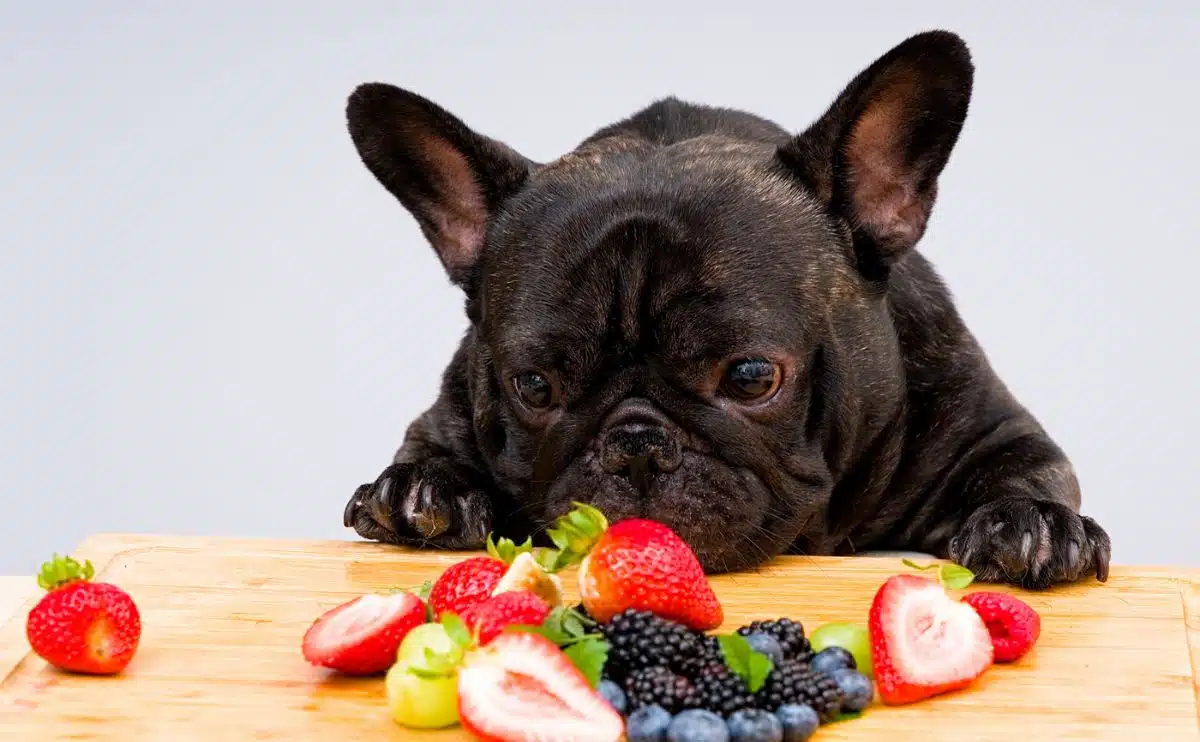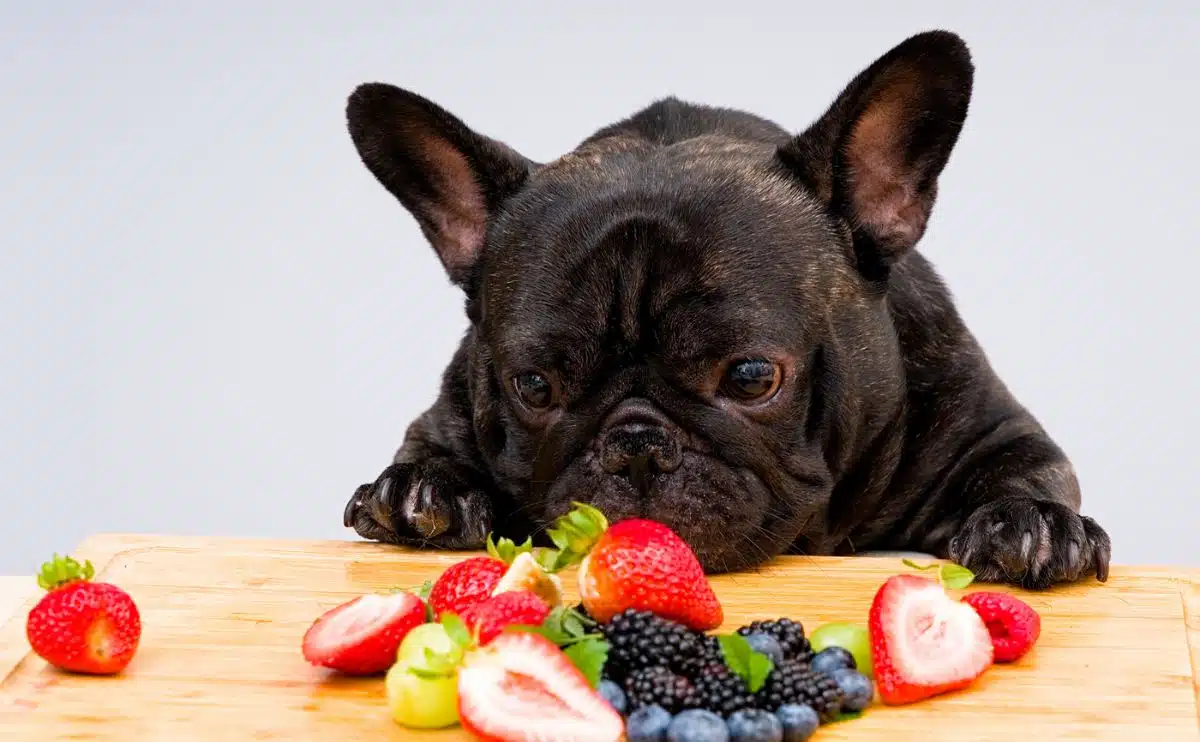
To keep the lights on, we receive affiliate commissions via some of our links. Our review process.

Although fruit isn’t required in a dog’s daily diet, there’s no question that fruits have health benefits for our furry friends. And they love the sweet flavors and varying textures. Many premium dog food brands even include whole fruits to boost the nutritional value (and taste) of their formulas. But, as is the case with all types of human foods, some fruits that we eat can be quite harmful to our canine companions. We give you a comprehensive guide of the best fruits for your pup, their health benefits, safe feeding guidelines, and fruits to avoid giving your dog.
Healthy Ways To Add Fruit To Your Dog’s Diet
Contents
Many fruits make yummy snacks straight from your fridge or pantry (as long as you wash them first), or you can easily use them in homemade dog treats. They also make great food toppers to entice picky eaters. Although many fruits are low in calories, you still need to make sure you share them with your furry friend in moderation. And always check with your veterinarian before you give your pup any new food.
Experts agree that it’s extremely important to moderate treats, snacks, or any additional food you give your dog. “I regularly come across dogs who are overweight, and often the underlying reason is that they eat too many treats in addition to their dog food,” says Hannah Godfrey, BVetMed, MRCVS, a small animal veterinarian at Bridges Veterinary Surgery in Cardiff, Wales.
“It’s easy to get carried away when giving your dog treats, especially if you’re training them, but to avoid becoming overweight or unhealthy, treats should be no more than 10% of a dog’s daily food intake.”
Godfrey shares one example of how easy it is for owners to fall into the treat trap. “I saw a young rescue dog recently who was a bit anxious. The owner was giving lots of treats to try to train them and combat boredom and separation anxiety. As a result, they were piling on the pounds! Thankfully, by giving fewer treats, swapping treats for healthier raw carrots, and providing other types of rewards and enrichment, the dog lost weight.”
What’s The Best Fruit For Dogs? Top 8 Choices
Many of the most popular fruits for humans are also the healthiest options for our four-legged friends. This makes dog fruit treats easy because you likely keep these on hand for your family. Just be sure to follow the necessary modifications and serving suggestions for safe snacking.
1. Blueberries
Perhaps the crown jewel of all fruit, blueberries are an amazing nutrient-dense superfood with multiple health benefits for us and our furry sidekicks. Another bonus, they require no de-seeding or other safety modifications (other than washing) for most dogs. Fresh and frozen blueberries are a hit with most dogs.
For small dogs, you should chop or mash them up to avoid the potential for choking. Dogs can safely have a handful of blueberries every day. I’ve found that blueberries are fantastic to use as low-calorie training treats, particularly when you need to give multiple rewards during a training session.
Benefits
- Low in calories and sugar
- Rich in antioxidants and phytochemicals, which help prevent cell damage, have anti-cancer properties and fight heart disease
- High amounts of fiber for healthy digestion and vitamin C for immune health
- Anti-inflammatory properties
- Good source of vitamin K, calcium, iron, magnesium, and zinc
Our Personal Experience
“Our Cavaliers LOVE blueberries as treats. You can freeze them, too so they aren’t as messy to eat (and they last longer). It’s a nice, sweet treat in the summertime. We also like to mix them up with yogurt or peanut butter in a frozen mold to make yummy treats too”.
– Sadie C., Canine Journal
2. Apples
Many dogs love the crunchy texture and sweet taste of apples, and apple slices are a super healthy treat as long as you remove the seeds and core. When chewed, apple seeds release a small amount of cyanide, which can be toxic to dogs in large amounts. The core is a choking hazard and can be difficult for dogs to digest. Apple skin is fine for dogs in moderation.
Stick to two or three apple slices at treat time. Too much apple at one time can cause a tummy ache or diarrhea. And a whole apple contains too much fructose (a “fruit sugar”) for our pups. Dogs love raw apples, but you can also add plain, pureed apples to homemade baked treats.
Benefits
- Excellent source of fiber, vitamins A and C, potassium, and antioxidants
- Low in calories
- Fiber-rich apple peels can help regulate digestion and maintain a healthy weight
- Helps clean teeth
- Green apples contain slightly less sugar and carbs and a bit more vitamin A than red apples
3. Pumpkin
Pumpkin is a frequent addition to premium dog food, treats, and supplements for its many health benefits, with digestive health topping the list. Pure canned pumpkin (without spices) is the easiest way to give your pup this fruit, but you can also feed your dog fresh pumpkin flesh (raw or cooked). Plain roasted pumpkin seeds are safe and healthy snacks for pups, but they’re fairly high in fat, so you should feed them sparingly.
Benefits
- High in fiber, vitamins A and K, and copper
- Excellent remedy for diarrhea, constipation, and anal gland problems
- Good source of vitamins C and E, iron, and folate
- Supports skin, coat, and immune health
- Low in sugar
- Can feed daily in small amounts for healthy digestion
Our Personal Experience
“My dog has had an occasional upset tummy, and my go-to cure is adding pumpkin to her diet for a couple of days. It always settles her stomach, plus she loves the taste of it. It’s a win-win!”
– Kimberly A., Canine Journal
4. Watermelon
Consisting of 92% water, watermelon is the perfect fruit to keep your dog hydrated during hot summer outings. Just make sure you remove the seeds and rind before sharing this nutritious treat with your four-legged friend because they can cause intestinal blockage. However, watermelon is fairly high in sugar, so it’s best to limit your pup to one slice.
Benefits
- High in potassium, vitamins A, B-6, and C
- Good fruit choice for overweight dogs (contains the amino acid arginine, which helps burn fat)
- Low in calories and carbohydrates
- Can keep your pup hydrated
Our Personal Experience
“My dog loves watermelon, and the kids love sharing it with her. I suggest feeding it to your dog outside as the juiciness of the fruit can drip from your dog’s mouth and make your floors sticky.”
– Kimberly A., Canine Journal
5. Strawberries
Another fave fruit among us humans, strawberries combine a juicy, fun texture with a sweet, tart taste that most dogs love to devour. They’re an excellent treat fresh or frozen, but be sure to cut them into smaller pieces to avoid choking. How many strawberries can dogs have each day? One is sufficient for small dogs, medium-sized dogs can have two or three, and large dogs can eat up to five per day.
Benefits
- Extremely rich in vitamin C and antioxidants for cell and immune health
- Low in calories and less sugar than apples and bananas
- High-fiber content is good for digestive health
- Support heart health
- Contain omega-3 fatty acids for skin and coat health
- Contain an enzyme that helps whiten teeth
6. Bananas
America’s most popular fruit, bananas are a healthy choice for our pups as long as you peel them first and feed in moderation. The peels aren’t toxic, but they can be difficult to digest and can cause intestinal blockage. Although bananas contain many nutrients, there’s a fair amount of sugar lurking inside that peel (and the sugar and carb content continue to rise as bananas ripen).
Therefore, be mindful to give your pup small amounts of banana and not feed it frequently. Also, they’re not a healthy choice for diabetic or overweight dogs. Still, for many pups, mashed bananas make an easy and healthy addition to homemade baked dog treats. I blend a small amount together with frozen blueberries or strawberries for a paw-fect pup smoothie.
Benefits
- Low in calories and cholesterol
- High in potassium, fiber, biotin, vitamins C and B6, and copper
- Help maintain healthy blood pressure
- Support brain, bone, muscle, skin, coat, and immune health
Our Personal Experience
“Sometimes my kiddos don’t finish their bananas, so I cut them up and put them in my dog’s food dish for her as a little snack. She gobbles it up. Funny enough, if I try to give her half of a banana that’s not cut up, she refuses to eat it. She’s very particular about how she wants her bananas.”
– Kimberly A., Canine Journal
7. Cucumbers
Although many think of cucumbers as a vegetable, they’re technically a fruit. While cucumbers aren’t nearly as tasty as many other fruits (or veggies, for that matter), many dogs aren’t turned off by their lack of flavor. An excellent fruit for overweight dogs, cucumbers are 96% water but loaded with vitamins and minerals.
Cucumber skin and seeds aren’t toxic to dogs (and they contain the majority of nutrients), but some dogs may have a bit of trouble digesting them. So if your pup has a sensitive tummy, you may want to peel and remove the seeds before sharing cuke slices with your dog. And don’t feed your pup pickles, as they contain too much salt.
Benefits
- Very low in calories and sugar
- Excellent for hydration and overweight dogs
- Contain vitamins B1, C, and K, biotin, copper, magnesium, and potassium
- Anti-inflammatory properties
- Moderate fiber content
8. Cantaloupe
This succulent melon is loaded with nutrients, a fantastic source of water and fiber, and is low in calories, but the high sugar content makes moderate feeding important. It’s not a great choice for dogs with diabetes or those packing extra pounds. Although the seeds and rind aren’t toxic, they could pose a choking hazard, so it’s best to remove them.
Benefits
- 90% water, a fantastic for keeping your dog hydrated
- Fiber-rich to support digestive health
- High in vitamins A and C for cell and immune health
- Good source of vitamins B6 and K, potassium, calcium, niacin, folate, and more nutrients
- Supports heart health
What Other Fruits Are Good For Dogs?

Apricots
One of several exotic fruits on our list, apricots are safe for dogs as long as you remove the pit, leaves, and stem. Apricot pits are a choking hazard and contain cyanide, which is toxic to dogs. Apricots are best served cut into small pieces to make them easier to digest. The flesh is a good source of vitamins A and C, dietary fiber for digestive regulation, potassium, and antioxidants, like eye-health booster beta-carotene.
Blackberries
Blackberries are lower in calories and sugar than many fruits, and they take little food prep for pup safety. Rich in many vitamins and minerals, antioxidants, fiber, and omega-3 fatty acids, they’re excellent for whole-body health. However, it’s important to feed only one to three berries per day, depending on your pup’s size. Blackberries contain a small amount of naturally occurring xylitol, which is extremely toxic to dogs in moderate to large amounts.
Coconut
Coconut meat is not toxic to dogs and is a bit healthier for our pups than coconut oil because it’s slightly lower in fat. However, both have high fat content, so they should be fed in small amounts. And too much coconut can cause tummy troubles and bloating. Both the meat and oil contain antioxidants and other nutrients that help boost the immune system, reduce inflammation, and are good for healthy skin.
Cranberries
Cranberries are best known for their ability to combat urinary tract infections (UTIs) in humans, but studies in dogs aren’t conclusive. A few cranberries are safe for dogs, but too many can cause stomach upset and lead to bladder stones. Fortunately, given this berry’s tartness, many dogs aren’t big fans. And there are plenty of other fruits that are healthier for our canine companions.
Kiwi
Take note if you’re a big fan of fruit and the low-calorie health benefits. Kiwi packs more vitamin C than oranges and more potassium than bananas. While they’re a superfruit for us humans and have some health benefits for our furry friends, there are healthier fruit options for your pup. You can share a small amount of kiwi flesh (chopped up to avoid choking and no skin) with your pup, but too much can cause diarrhea or an upset stomach.
Mangos
Mangos are fiber-rich and contain vitamins A, B6, C, and E, so they’re a healthy snack for our pups. However, tropical fruits like Mangos tend to have higher sugar levels than other types of fruit, so they’re only suitable for an occasional treat. Before sharing Mango with your pup, it’s essential to remove the pit because it contains a small amount of cyanide and poses a choking hazard. The skin isn’t toxic, but it can cause stomach discomfort, so peeling it is a good idea.
Oranges
An excellent source of vitamin C, potassium, and fiber, oranges (and clementines and nectarines) are great for your pup’s immune system. But vets recommend giving your dog only a slice or two with the peel and seeds removed. These citrus fruits have moderate sugar levels, but too many slices can upset your dog’s tummy due to the high citric acid.
Papaya
Unlike many other tropical fruits, papaya is low in sugar and calories. Its flesh is loaded with fiber, vitamins A, C, E, and K, calcium, and potassium. It’s a fantastic treat (in moderation) for your pup’s digestive, immune, heart, skin, and coat health. But you’ll first need to remove the seeds, which contain trace amounts of cyanide, and the rind, which can cause choking or intestinal blockage.
Peaches
Despite their sweet taste that most dogs love, peaches are relatively low in sugar, making them a terrific, healthy snack for dogs. However, it’s crucial to remove the pit because it contains cyanide. Chopped-up fresh or frozen peaches are a great source of vitamins A and C, antioxidants, fiber, and more, but steer clear of canned peaches, which are saturated in sugary syrup.
Pears
Pears contain many nutrients for our pups, including fiber, vitamins C and K, and copper. Like apples, you’ll need to remove the core and seeds, which release cyanide when chewed. The skin isn’t toxic to dogs, so it’s safe to feed pear slices with the skin on.
Pineapple
Another sweet and tangy tropical fruit that’s safe for dogs, pineapple is packed with fiber and many vitamins and minerals. It also contains the enzyme bromelain, which helps our bodies absorb protein more efficiently. However, pineapple is fairly high in sugar, so moderation is key.
Raspberries
A close relative of blackberries, raspberries have similar multiple health benefits for our canines and require no food prep (other than washing) to share with our pups. They’re low in calories and sugar but high in antioxidants, anti-inflammatory properties, vitamin C, fiber, manganese, and other minerals. However, like blackberries, they contain trace amounts of naturally occurring xylitol, so it’s wise to share them sparingly.
Tomatoes
Ripe (red) tomatoes are healthy for our pups as long as you remove the leaves, stems, and any other green parts because they contain solanine, which is toxic to dogs. Tomatoes contain a lot of fiber, antioxidants, vitamins, minerals, and folate for whole-body health. But they also have a high acidic content, so it’s important to feed them in moderation to avoid stomach upset.
What Fruits Can Dogs Not Eat?

Grapes & Raisins
Grapes and raisins (dried grapes) top the list of fruits to NEVER give your pup. They’re extremely toxic to dogs and can even cause acute (sudden) kidney failure. Vomiting is an early sign, followed by depression and low energy. While this doesn’t occur with every dog who eats a grape, you certainly don’t want to take the chance.
Cherries
While cherries are nutritious (and delicious cocktail toppers) for humans, they’re off-limits for our canine counterparts. The stem, leaves, and pit contain cyanide, which is toxic to dogs. The pit can also pose a choking hazard or cause an intestinal blockage. Also, while the flesh around the pit isn’t toxic to dogs, it typically causes an upset stomach. Signs of cyanide poisoning include difficulty breathing, red gums, and dilated pupils.
Avocado
A super healthy and human favorite fruit, avocado isn’t usually recommended for pups. The leaves, skin, pit, and fleshy inside of avocados contain persin, a dangerous toxin for many mammals. Veterinary experts say that canines are more resistant to this toxin than other animals, but it can still cause vomiting and diarrhea in dogs.
Persin levels aren’t as high in the flesh of avocadoes, so a very small amount may be okay to give your pup on rare occasions. But this flesh is also high in fat, which can lead to an upset stomach, pancreatitis, and weight gain if they eat too much. And keep in mind that the pit poses a choking hazard.
Lemons & Limes
Although it helps that dogs typically dislike the scent of these citrusy fruits, they’re not safe for our furry friends. First, they contain a lot of citric acid, which can cause digestive problems. But more concerning is that the skin and rind of lemons and limes contain psoralen, which is toxic to dogs. And swallowing the rinds can also result in gastric obstruction.
Are Commercial Dried Fruits Okay For Dogs?
Dehydrated or freeze-dried fruit can be a terrific alternative to traditional dog treats as long as you check the package’s ingredients. Many contain added sugars, preservatives, and other ingredients that aren’t healthy for dogs. And make sure you never give your pup anything containing the sugar substitute xylitol because it’s extremely toxic to dogs.
We recommend Nature’s Turn Freeze-Dried Fruit Snacks, which contain 100% non-GMO fruit. While they’re convenient to avoid food prep time, keep in mind these snacks remove the bulk of water from the fruit, so fresh fruit is the better option for your pup.
What Should I Do If My Dog Ate Toxic Fruit?
If you suspect your pup ate a toxic fruit, pit, or seeds, call your veterinarian immediately. You can also contact the Pet Poison Helpline at (855) 764-7661. Do not try to induce vomiting without consulting your vet or the poison hotline because the toxin could cause further damage on the way up.
Depending on what your dog ate and how soon the dog is treated can affect the total vet bill. The cost can be over $1,000, depending on your dog’s health status. Pet insurance can cover claims related to dogs eating toxic substances. Find the best pet insurance policy for you and your dog.
Fruits Dogs Can Eat Chart
We’ve compiled this handy chart so you can keep in mind the safe feeding guidelines for fruits that dogs can and can’t eat. Remember to feed fruit in moderation, as with all treats and snacks.
| Safe In Moderation | Remove Seeds, Pits, Rind, Leaves, Etc. |
Not Safe |
|---|---|---|
| Bananas (peeled) | Apples | Avocado |
| Blackberries | Apricots | Cherries |
| Blueberries | Cantaloupe | Grapes |
| Coconut | Mango | Lemons |
| Cranberries | Oranges | Limes |
| Cucumbers | Papaya | Raisins |
| Kiwi (w/out skin) | Peaches | |
| Pineapple | Pears | |
| Pumpkin | Plums | |
| Raspberries | Tomatoes | |
| Strawberries | Watermelon |
Other Human Foods That Are And Aren’t Safe For Dogs
As you’ve learned from this article, it’s crucial to take many precautions when sharing fruit with your pup. But there are several other potentially life-threatening or unhealthy human foods that you should avoid giving your furry friend. See our comprehensive guide on which foods dogs can’t eat to ensure you’re keeping your pup as safe and healthy as possible.
Tagged With: Food Safety